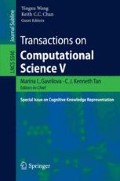Abstract
As one of the important problems of knowledge discovery and data analysis, knowledge reduction can make the discovery of implicit knowledge in data easier and the representation simpler. In this paper, a new approach to knowledge reduction in concept lattices is developed based on irreducible elements, and characteristics of attributes and objects are also analyzed. Furthermore, algorithms for finding attribute and object reducts are provided respectively. The algorithm analysis shows that the approach to knowledge reduction involves less computation and is more tractable compared with the current methods.
Access this chapter
Tax calculation will be finalised at checkout
Purchases are for personal use only
Preview
Unable to display preview. Download preview PDF.
References
Wille, R.: Restructuring Lattice Theory: an Approach Based on Hierarchies of Concepts. In: Rival, I. (ed.) Ordered Sets, pp. 445–470. Reidel, Dordrecht (1982)
Ganter, B., Wille, R.: Formal Concept Analysis: Mathematical Foundations. Springer, New York (1999)
Pawlak, Z.: Rough Sets. International Journal of Computer and Information Sciences 11, 341–356 (1982)
Kent, R.E.: Rough Concept Analysis: a Synthesis of Rough Sets and Formal Concept Analysis. Fundamenta Informaticae 27, 169–181 (1996)
Yao, Y.Y.: Concept Lattices in Rough Set Theory. In: 2004 Annual Meeting of the North American Fuzzy Information Processing Society (NAFIPS 2004), pp. 796–801. IEEE Press, Los Alamitos (2004)
Oosthuizen, G.D.: Rough Sets and Concept Lattices. In: Rough Sets, and Fuzzy Sets and Knowledge Discovery (RSKD 1993), pp. 24–31. Springer, London (1994)
Saquer, J., Deogun, J.: Formal Rough Concept Analysis. In: Zhong, N., Skowron, A., Ohsuga, S. (eds.) RSFDGrC 1999. LNCS(LNAI), vol. 1711, pp. 91–99. Springer, Heidelberg (1999)
Saquer, J., Deogun, J.: Concept Approximations Based on Rough Sets and Similarity Measures. International Journal of Applied Mathematics and Computer Sciences 11, 655–674 (2001)
Düntsch, I., Gediga, G.: Algebraic Aspects of Attribute Dependencies in Information Systems. Fundamenta Informaticae 29(1-2), 119–133 (1997)
Pagliani, P.: From Concept Lattices to Approximation Spaces: Algebraic Structures of Some Spaces of Partial Objects. Fundamenta Informaticae 18(1), 1–25 (1993)
Hu, K.Y., Lu, Y.C., Shi, C.Y.: Advances in Concept Lattice and Its Application. Journal of Tsinghua University (Science & Technology) 40(9), 77–81 (2000)
Ho, T.B.: An Approach to Concept Formation Based on Formal Concept Analysis. IEICE Transactions on Information and Systems E 782D(5), 553–559 (1995)
Carpineto, C., Romano, G.: GALOIS: an Order-theoretic Approach to Conceptual Clustering. In: The Tenth International Conference on Machine Learning, pp. 33–40. Elsevier, Amsterdam (1993)
Godin, R.: Incremental Concept Formation Algorithm Based on Galois (Concept) Lattices. Computational Intelligence 11(2), 246–267 (1995)
Oosthuizen, G.D.: The Application of Concept Lattice to Machine Learning. Technical Report, University of Pretoria, South Africa (1996)
Grigoriev, P.A., Yevtushenko, S.A.: Elements of an Agile Discovery Environment. In: Grieser, G., Tanaka, Y., Yamamoto, A. (eds.) DS 2003. LNCS(LNAI), vol. 2843, pp. 309–316. Springer, Heidelberg (2003)
Zhang, W.X., Wei, L., Qi, J.J.: Attribute Reduction Theory and Approach to Concept Lattice. Science in China Series F-Information Science 48(6), 713–726 (2005)
Zhang, W.X., Wei, L., Qi, J.J.: Attribute Reduction in Concept Lattice Based on Discernibility Matrix. In: Ślȩzak, D., et al. (eds.) RSFDGrC 2005. LNCS(LNAI), vol. 3642, pp. 157–165. Springer, Heidelberg (2005)
Zhang, W.X., Qiu, G.F.: Uncertain Decision Making Based on Rough Sets. Tsinghua University Publishing House, Beijing (2005)
Carpineto, C., Romano, G.: Concept Data Analysis. John Wiley & Sons, Ltd., Chichester (2004)
Wang, X., Zhang, W.X.: Attribute Dependence and Reduction in Formal Contexts. International Journal of Computer Science and Knowledge Engineering 2(1), 35–49 (2008)
Wang, X., Ma, J.M.: A Novel Approach to Attribute Reduction in Concept Lattices. In: Wang, G., et al. (eds.) RSKT 2006. LNCS(LNAI), vol. 4062, pp. 522–529. Springer, Heidelberg (2006)
Wang, X., Zhang, W.X.: Relations of Attribute Reduction Between Object and Property Oriented Concept Lattices. Knowledge-Based Systems 21(5), 398–403 (2008)
Davey, B.A., Priestley, H.A.: Introduction to Lattices and Order. Cambridge University Press, Cambridge (2002)
Author information
Authors and Affiliations
Editor information
Editors and Affiliations
Rights and permissions
Copyright information
© 2009 Springer-Verlag Berlin Heidelberg
About this chapter
Cite this chapter
Wang, X., Zhang, W. (2009). Knowledge Reduction in Concept Lattices Based on Irreducible Elements. In: Gavrilova, M.L., Tan, C.J.K., Wang, Y., Chan, K.C.C. (eds) Transactions on Computational Science V. Lecture Notes in Computer Science, vol 5540. Springer, Berlin, Heidelberg. https://doi.org/10.1007/978-3-642-02097-1_7
Download citation
DOI: https://doi.org/10.1007/978-3-642-02097-1_7
Publisher Name: Springer, Berlin, Heidelberg
Print ISBN: 978-3-642-02096-4
Online ISBN: 978-3-642-02097-1
eBook Packages: Computer ScienceComputer Science (R0)

